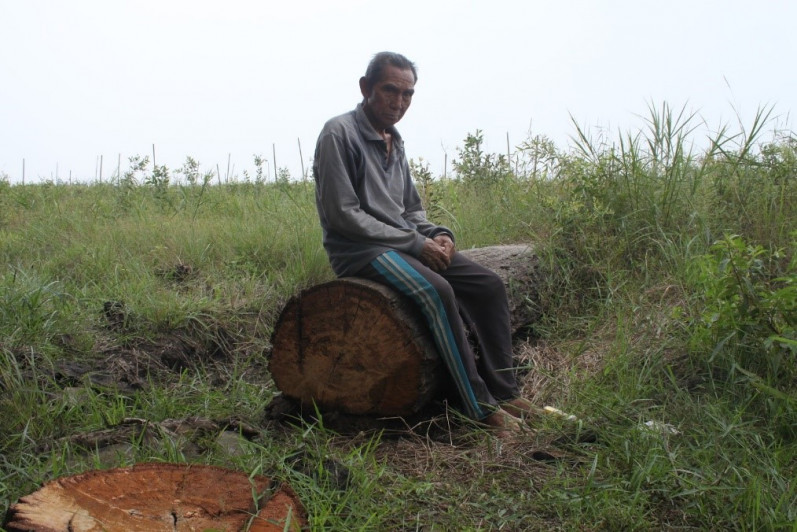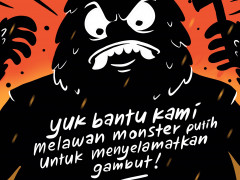Swamp Buffalo, How Your Story Has Changed
By Budi KurniawanRiding Village's Lost Treasure

Riding is known as a village surrounded by peatlands and has abundant natural resources. Prior to 2000, before the companies entered the village, it was still surrounded by large peat swamp trees such as jelutong and shorea. But that was a long time ago. Now the village is surrounded by oil palm and rubber plantations. Life is getting harder, catching fish is getting harder because rivers and canals start to dry up all year round.
Riding his favorite bicycle, Ruslan pedaled for almost an hour before he arrived at a small wooden pier at the end of the village. This pier is known to the locals as Pangkal Jerambah Port. He left his bicycle, then rushed onto a wooden boat to look for fish by tracing along the Batanghari River which is right next to his village. He used nets and fishing rods to catch kissing gourami, climbing perch, catfish, mudfish, giant snakehead, forest snakehead, and wallago catfish. It didn't take long, he could catch the freshwater fish easily.
By late afternoon, it was time to pull over. He rowed his boat towards the pier, brought down the various types of fish he caught and went home. He sold some of the fish to collectors and people who were waiting at the riverbank. He had been doing this routine for years during the day or night, depending on the weather, wind, and moonlight. But now, it is just a memory. Fish has become expensive for the residents of Riding Village because it is getting more and more difficult to catch.
“Back then, when I was young and single, the jungle and peat forests were still very dense. It was so green and beautiful. Whatever crops we planted could grow quickly and produce an abundant harvest. It was still very easy to find hundreds of trees up to two meters in diameter. When entering the forest to look for food, it was common for us to be greeted by wild animals such as tigers, elephants, monkeys, and siamangs," said Ruslan.
Ruslan was married in 1965 when the government was aggressively crushing the Indonesian Communist Party (PKI) movement. At that time, Riding residents could catch up to 100 kg of fish per day because the rivers were still flowing fast. In the small ripples of the Rasau River, for example, there were still many large fish up to a dozen kilograms in weight such as wallago catfish, climbing perch, tinfoil barb, and mudfish.
The people of Riding Village were well aware of the symbiotic mutualism between nature and humans. They kept the forest from being cut down haphazardly and did not burn it for unproductive purposes so that nature could be their source of livelihood. They thought the slightest damage would have a bad impact on future generations.
As time goes by, the residents have to face the fact that the dense forests are slowly starting to disappear. Peatlands are accessible to anyone and almost nothing can hinder them. The increasing number of residents in Riding Village has caused forest clearing activities to meet their daily needs. However, Ruslan assessed that this was not the real cause of forest destruction.
“As far as I remember, in early 2002, our village really started to change. Slowly but surely the jungle and peat forests began to disappear. The peat swamp has become plantations owned by private companies. The rivers where we used to fish were turned into main roads, rubber, oil palm, and acacia plantations. Now, it's getting harder and harder for us to find food from the forests and catch fish in the rivers among the peat swamp,” said Ruslan.
Sitting on the veranda of his son's wooden hut, Ruslan, 73 years old, tried to recall memories of his youth from decades ago. He could still tell all stories and events in detail. Between the chats, his gaze suddenly became blank, our light discussions stopped. He was furious to see the condition he had to face.
Taking a deep breath, Ruslan recounted what he had felt. To prove his point, Ruslan invited the Pantau Gambut team to look at a large tree lying just behind the hut. He sat on the blackened shorea tree which was burned during the 2015 massive fire. The diameter reached 100 cm and the length was up to 20 meters. Apart from shorea tree, perepat, santol, jelutong, and blackboard trees also grow on the same land. "There used to be a lot of trees that were bigger than the one I am sitting on, but now they are almost gone," said Ruslan.
Arion, Head of Neighborhood 12, Riding Village, Pangkalan Lampam Subdistrict, Ogan Komering Ilir (OKI) agreed with what Ruslan said. He had also enjoyed the time when it was convenient for them to catch fish around this village. However, now the rivers such as Sindur, Rasau, Muara Bijuku, Rengas Abang, Rengas Kuning, Pengabungan, Setanjung, Damping, Pengajab, Lebak Simpanan, and Pangkalan Jerambah are getting shallower and most of them have dried up. As a result, residents can no longer use boats to carry out their daily activities. "After those companies came here, catching fish has become increasingly difficult, rice harvest is not optimal because the fields are dry," he said.
Iswadi, 46 years old, who is the Head of Sub-village 2 also admitted the same thing. He said the shift from swamp, peat, and river areas into industrial areas has made it increasingly difficult for Riding villagers (around 4,500 people in 1,500 households) to find food.
"We used to be landlords, now most of us are farm laborers, factory workers, and plantation workers," said Iswadi.
Iswadi said that currently, several companies have been operating around his village. These companies include PT Bumi Mekar Hijau (BMH), PT Bumi Andalas Permai (BAP) and PT Sebangun Bumi Andalas (SBA) which he knows has been operating since 2004. These three companies are suppliers of acacia wood, which is the raw material for paper mills (PT OKI Pulp and Paper Mills). Moreover, there are also oil palm plantations clearing the lands around the village. These plantations belong to PT Bintang Harapan Palma (BHP) which has started their operation since 2018.
_.gif)



